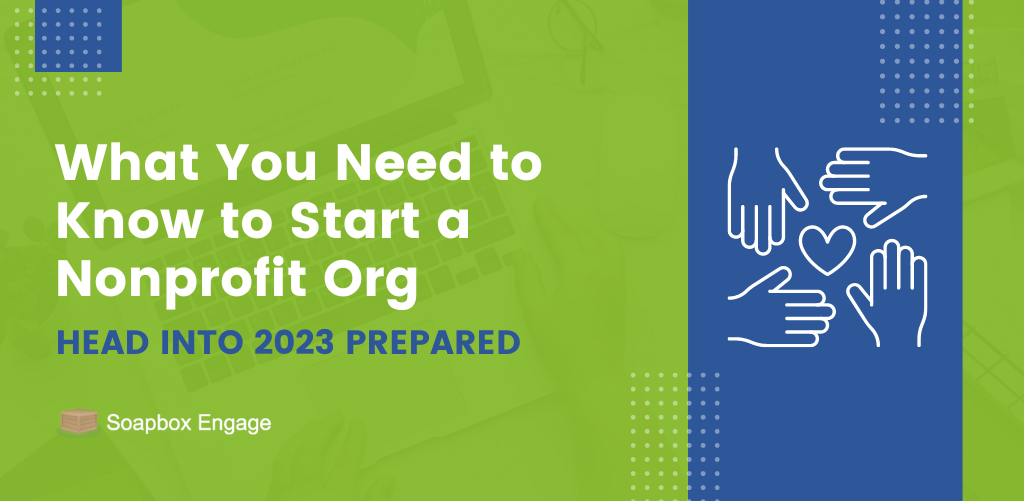
You’ve decided to start a nonprofit in the New Year. That’s fantastic! There are so many needs and injustices in the world just waiting to be addressed. That feels especially true in 2022, after a tumultuous few years. There are currently 1.8 million nonprofits in the U.S., and we know that there are still so many gaps that need to be filled. Whether your mission is to improve your local community or address national or international issues, the world needs champions like you.
Operating a nonprofit can be an enriching and life-giving journey, but it requires a lot of time, energy, and resources. It’s essential to be fully prepared and start the right way to avoid unnecessary complications and frustrations.
Unfortunately, starting a nonprofit includes a laundry list of not fun, but necessary tasks to set your organization up for success. We want to give you a basic outline of everything you need to know to start a nonprofit organization!
How to Start a Nonprofit in 2023
- Do your research before starting a nonprofit
- Lay the groundwork for your nonprofit
- The legal requirements of starting a nonprofit
1) Before you start your nonprofit, do your research

Conduct a needs analysis to gather demographic data and information about your potential service area. Find out whether there is a genuine felt or expressed a need for your services and identify any other organizations doing similar work. A nonprofit, for-profit, or government agency may already be offering similar services in your target area.
If another organization is already doing excellent work, it may be challenging to get enough support and funding for your nonprofit; you might inadvertently harm the other organization as well.
Conducting a needs analysis early in the exploratory phase of starting a nonprofit also helps you focus on the actual needs and wants of those you intend to serve. Too often, organizations aim to do good, but they focus on the wrong needs of the community.
Learn as much as you can about the community and those you are excited to serve. If you intend to start a US-based nonprofit, use resources like The Urban Institute and American FactFinder to gather useful data.
Involve members of the community you plan to serve in the needs assessment process. They know and love the community and can help you build trust with community leaders and influencer managers.
2) Lay the groundwork for your nonprofit

After you conduct your needs assessment and determine your goals, you can begin laying the foundation for your nonprofit.
Mission statement
Writing a thoughtful mission statement is critical because it defines your nonprofit’s purpose, your target audience, and how you plan to accomplish your goals. Every action and decision your nonprofit makes should support and advance your specific mission.
Make sure your mission statement is clear, concise, inspiring, and useful. It should help focus your work and guide all your decisions. Short and memorable is ideal. Most mission statements for nonprofits are about 16 words long. You want everyone involved in your organization to remember the mission and be able to explain it to others.
Business plan
A nonprofit is actually a business with modified goals and should operate as such. Successful nonprofits have a business plan, just like successful for-profit businesses. Your business plan should describe how the nonprofit intends to accomplish the goals in more specific details than your mission statement.
A business plan is essential when inviting significant donors to invest or asking foundations to fund your work. Business plans also help you recruit board members.
Your business plan should change and evolve as your organization grows, but your mission statement should stay the same unless your board thoughtfully decides to amend your mission.
Gather your board of directors
The board of directors is the governing body of your nonprofit. It is essential to recruit people to your board that can carry out a variety of roles like legal and financial oversight. The positions and people serving on your board will probably change as your nonprofit grows, but these people are critical to the success of your nonprofit.
Your board plays a critical role in ensuring the long-term success of your organization. As you begin, look for board members who have a passion for your mission.
State laws determine the minimum number of board members you need. The IRS recommends a minimum of three members. Ideally, you will select board directors who come from a variety of backgrounds, so they bring different perspectives, ideas, and opinions.
The first board will have unique responsibilities like setting the length of terms for all future board members and writing the requirements for board activities (meeting requirements, job descriptions, planning, oversight, and fundraising).
3) All the legal matters

When you start tackling the legal steps of establishing your nonprofit, it’s crucial to get information specific to your location. Every state and city has its own requirements. Make sure you comply with your state laws and requirements.
Articles of incorporation
Establishing your articles of incorporation gives credibility to your nonprofit’s programs and services. Articles of incorporation also minimize the legal liability of your directors and officers. It is important to note that incorporating your organization registers your nonprofit, but it does not make it tax-exempt.
Requirements for the articles of incorporation vary by state, but at a minimum, you’ll need to provide the following information.
- Name: The name of your organization cannot be the same or too similar to another entity. You can check the IRS’ Tax Exempt Organization Search to make sure.
- Registered agent: A registered agent accepts official documents and notices on behalf of your organization. You can hire a registered agent instead of appointing one, particularly if your nonprofit is run by volunteer board members who have other jobs.
- Incorporator: The incorporator signs and submits your formation documents to the appropriate state agencies. You will need at least one incorporator. Some nonprofits authorize attorneys or hire professional services to submit their filings.
Draft bylaws
Bylaws are the rules that you set to govern your organization. They dictate how board members are elected, how assets will be distributed, and other essential details. It is a good idea to have the help of an attorney or legal counsel when drafting your bylaws.
If you apply for tax-exempt status, you will need to include your bylaws in your application to the IRS. An attorney can help ensure your bylaws do not conflict with state or IRS requirements.
Apply for a Federal Employer Identification Number
The IRS uses FEIN or EIN numbers to identify businesses and nonprofits. Whether you plan to file for tax-exempt status or not, you will need an EIN number.
File for tax-exempt status
It can take up to a year for the IRS to approve your 501(c)(3) tax exemption application. The user fee is also fairly costly--up to $600, depending on the method of application. However, there are many benefits to gaining tax-exempt status that make the process worthwhile.
It is often advantageous to get help filling out your startup forms. If you cannot afford an attorney, ask your board members if they or someone they know might volunteer their expertise. You can also ask for pro-bono legal aid. Contact a local law school to find out if they offer student-run legal clinics. Your state’s nonprofit association can refer you to other helpful legal resources.
Register with your state’s agencies
Every state has an agency responsible for overseeing all nonprofits and charitable organizations (usually connected to the Attorney General’s office). If you plan to request financial contributions in any way, it is essential to register your nonprofit. If you plan to fundraise in other states, you may need to register there as well.
Annual reporting requirements
Tax-exempt organizations usually must file some kind of report with the IRS (usually Form 990), depending on their financial activity in that fiscal year. Form 990 reports your finances, activities, governing processes, directors, and key staff.
States also have their own financial reporting requirements, but they vary by state. Make sure you track your nonprofit’s finances and activities in detail and in a way that will make these annual reports easier to complete.
Soapbox Engage’s online donations app makes tracking and reporting donations a breeze. Not only will your donors appreciate the beautiful, mobile-friendly donation forms, but your accountant and tax attorney will also love the detailed donation reports.
These aren’t the fun, exciting parts of starting a nonprofit, but they are necessary to operate a healthy, thriving organization that makes a difference in the world. No matter what kind of work your nonprofit does, Soapbox Engage is excited to partner with you!
We have easy solutions for everything from online donations and peer-to-peer fundraising to online stores, directories, and event management. Join more than 300 other nonprofit organizations that use Soapbox Engage to make the world a better place!
Are you ready to take the next steps to start a nonprofit? Here are some helpful resources!
- 5 Marketing Strategies Every Nonprofit Should Implement: Quality marketing is an essential part of starting and growing a nonprofit. Here are five easy marketing strategies every organization should implement as quickly as possible.
- Powerful Salesforce Training for Nonprofits: Salesforce is a powerful tool that will help you do everything from maintain online directories to build a customized website. Attend a NPSP Days are excellent ways to learn how to get the most out of Salesforce in a fun, accessible environment. It’s also a great place to connect with other nonprofits in your community.
- 4 Skills Every Development Professional Must Have: As you establish and grow your nonprofit, it is critical to find a development professional with all the right skills to fundraise effectively. Here are four skills to look for as you interview development professionals.
